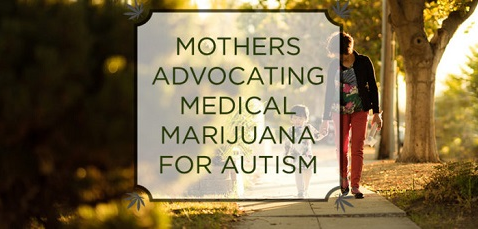American Mothers Advocate for Medical Marijuana in Autism Therapy
Both of Caitlin Castleberry’s sons, ages 8 and 9, sat unusually quietly for children their age as their mother gave a nearly hour-and-a-half phone interview. The reason: both boys are unique, having been diagnosed with different types of autism spectrum disorders. One of the boys is nonverbal, while the other prefers to express himself by taking things apart. “I call him a ‘reverse engineer’ because he can’t walk past a mechanical or electronic device without disassembling it,” says Castleberry. “You should see what our house looks like—it’s a junkyard of spare parts!”
More specifically, the boys suffer from rare forms of autism that do not affect intelligence but significantly impact the brain’s communication and emotional centers, leading to the socialization challenges common among children with such diagnoses.
According to the latest estimates from the U.S. Centers for Disease Control and Prevention (CDC), as of April 2018, one in every 59 children born in the United States is diagnosed with an autism spectrum disorder. In 2000, the rate was one in 150, indicating that the number of diagnosed cases continues to rise.
Castleberry and her husband, who live in New Orleans, believe the increase may be due to worsening environmental conditions or simply because doctors have become better at identifying various forms of autism over the past 15 years. “Doctors have studied this phenomenon in more detail. Now, more autistic children aren’t just lumped into the ‘developmentally delayed’ group or misdiagnosed as young schizophrenia patients,” Castleberry notes.
“Many people have their own theories about the origins of this syndrome,” she says. “But what interests me and many other parents is the fact that medical marijuana, currently banned for autism therapy, could actually help alleviate the symptoms.”
Castleberry is a co-founder and lead coordinator of the advocacy group “Mothers Advocating Medical Marijuana for Autism” (MAMMA), which works to legalize medical marijuana therapy for autism both regionally and at the federal level.
“Fortunately, many people no longer buy into the old propaganda about the supposed dangers of marijuana,” Castleberry says. “Some studies have already confirmed our long-held suspicions that, in certain doses, marijuana can help reduce autism symptoms.”
Medical Experts Urge Caution, but Research Continues
Meanwhile, medical professionals like Dr. Seth Ammerman, a pediatrician at Stanford University, believe parents should wait for more detailed evidence before using marijuana to treat their children. “Unfortunately, no clinical trials have been conducted on this specific use of medical marijuana. So it’s hard to say which strains or cannabinoid concentrations might be effective for different forms of autism,” Dr. Ammerman explains.
However, Ammerman notes that such a study with a large patient sample is currently underway in Israel. “As a specialist, I’m very interested in the results from our Israeli colleagues,” he says. “But given the political climate in the U.S., I doubt that even after the results are published, Congress will take decisive action to make marijuana therapy available to families with autistic children.”
Legal Status and Advocacy Efforts Across the U.S.
Currently, 10 U.S. regions, including the District of Columbia, allow the use of medical marijuana for autism therapy. States such as Delaware, Louisiana, Georgia, Michigan, Minnesota, and Pennsylvania permit access to cannabis for autistic patients. The District of Columbia, Massachusetts, California, Florida, and Oregon allow its use for autism under the broader definition of “chronic neurological disease.” Many of these states, like Georgia, strictly regulate the concentration of THC in products provided to patients.
MAMMA first published a collection of private trial results on the use of medical marijuana for autism on its website in early 2014. The organization now has chapters in Louisiana, Colorado, New York, Arizona, Ohio, and Texas.
Personal Stories: Seeking Alternatives to Pharmaceuticals
Twenty-seven-year-old Tiffany Carwile leads one of MAMMA’s regional chapters. Her four-year-old son, Jason, suffers from frequent bouts of anxiety and aggression, accompanied by tics similar to Tourette’s syndrome. “In Jason’s case, it’s like all the worst symptoms of various chronic illnesses have come together in one big disorder,” she says. “It’s surprising that, despite all the possible conditions, doctors still haven’t universally included autism among those eligible for marijuana therapy.”
The Carwile family lives in the small town of Bryan in rural northwest Ohio, where medical marijuana products are hard to obtain even after the opening of the legal market. For several years, Tiffany has avoided giving her son pharmaceutical drugs to spare him their negative side effects. Aside from his aggressive episodes, Jason is a quiet and withdrawn child whose only passion is singing karaoke.
“The antipsychotics doctors prescribed before completely robbed him of any emotion,” his mother says. “I didn’t want my son to live like a zombie, so I want to try marijuana in his therapy. At least it won’t drain his energy for life like those ‘medications’ did.”
Currently, Tiffany and other Ohio MAMMA members are collecting signatures for a petition they hope to send to Governor John Kasich. “Our petition explains that pharmaceutical drugs, unlike marijuana, simply mask the symptoms without actually treating them,” Carwile tells reporters. “Of all the remedies known to humanity, only marijuana has helped children like Jason truly get rid of symptoms like panic attacks and aggression.”
Overall, Tiffany and many of her fellow advocates hope that the government will eventually remove marijuana from the list of banned substances, allowing doctors and parents to freely use it in treating children. “I’m confident that people will understand our situation and that Americans will support full decriminalization or legalization of marijuana to give chronically ill children a chance at a normal, healthy life,” she asserts.



